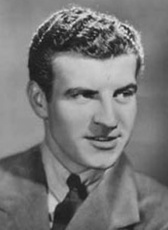??American leading man of vast charisma, Robert Preston was the son of a garment worker and a record store clerk and grew up in Los Angeles. He was a trained musician, playing several instruments, and in high school became interested in theatre. He joined the Pasadena Community Playhouse, taking classes and appearing in scores of plays alongside such soon-to-be-well-known actors as Dana Andrews, George Reeves, Victor Mature and Don DeFore. Even in the distinguished company of Playhouse veterans like Victor Jory and Samuel S. Hinds, young Preston Meservey--or Pres, as he was always known to intimates--was an acknowledged star in the making. During one play a Paramount scout saw him and he signed a contract with the studio, which renamed him Robert Preston. After several roles in inconsequential films, Preston became a favorite of director Cecil B. DeMille, who cast him in several films but became nevertheless one of the few people Preston actively and publicly disliked. In 1946, after serving in England with the Army Air Corps, Preston married Kay Feltus (aka Catherine Craig), whom he had known in Pasadena. He struggled through numerous unfulfilling roles in the '40s, then relocated to New York and concentrated on theatre. He played many roles on Broadway and in 1957 got the part that would immortalize him in entertainment history: Professor Harold Hill in the musical "The Music Man". He won a Tony Award for the role and repeated it in the film version (The Music Man (1962)). Now a star of the first magnitude, Preston alternated between stage and film, winning another Tony for "I Do, I Do" and appearing to enormous good effect in such films as The Dark at the Top of the Stairs (1960), All the Way Home (1963) and Junior Bonner (1972). He received an Oscar nomination for his triumphant portrayal of a witty, gay entertainer in Victor Victoria (1982). He died in 1987 from lung cancer, after a career that took him from modest supporting lead to national treasure.

